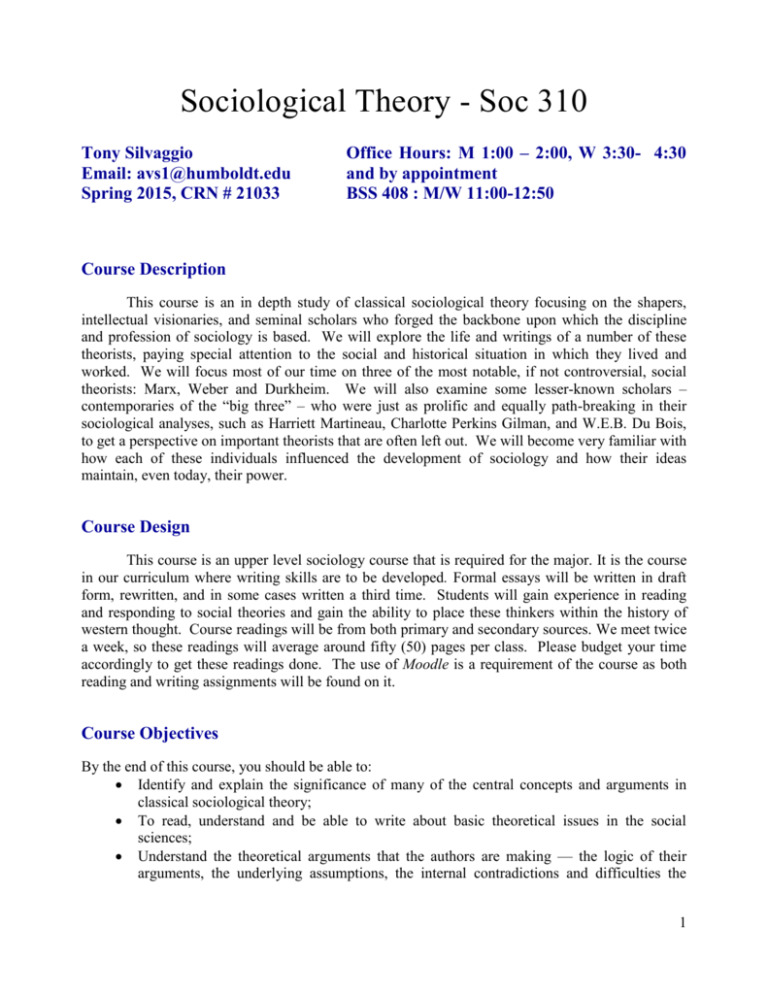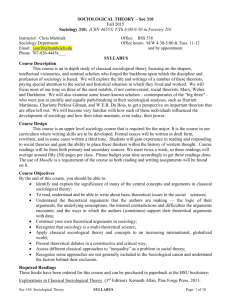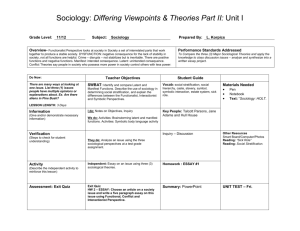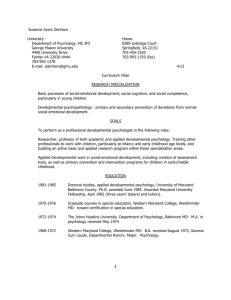Soc 310 Soc Theory - T Silvaggio
advertisement

Sociological Theory - Soc 310 Tony Silvaggio Email: avs1@humboldt.edu Spring 2015, CRN # 21033 Office Hours: M 1:00 – 2:00, W 3:30- 4:30 and by appointment BSS 408 : M/W 11:00-12:50 Course Description This course is an in depth study of classical sociological theory focusing on the shapers, intellectual visionaries, and seminal scholars who forged the backbone upon which the discipline and profession of sociology is based. We will explore the life and writings of a number of these theorists, paying special attention to the social and historical situation in which they lived and worked. We will focus most of our time on three of the most notable, if not controversial, social theorists: Marx, Weber and Durkheim. We will also examine some lesser-known scholars – contemporaries of the “big three” – who were just as prolific and equally path-breaking in their sociological analyses, such as Harriett Martineau, Charlotte Perkins Gilman, and W.E.B. Du Bois, to get a perspective on important theorists that are often left out. We will become very familiar with how each of these individuals influenced the development of sociology and how their ideas maintain, even today, their power. Course Design This course is an upper level sociology course that is required for the major. It is the course in our curriculum where writing skills are to be developed. Formal essays will be written in draft form, rewritten, and in some cases written a third time. Students will gain experience in reading and responding to social theories and gain the ability to place these thinkers within the history of western thought. Course readings will be from both primary and secondary sources. We meet twice a week, so these readings will average around fifty (50) pages per class. Please budget your time accordingly to get these readings done. The use of Moodle is a requirement of the course as both reading and writing assignments will be found on it. Course Objectives By the end of this course, you should be able to: Identify and explain the significance of many of the central concepts and arguments in classical sociological theory; To read, understand and be able to write about basic theoretical issues in the social sciences; Understand the theoretical arguments that the authors are making — the logic of their arguments, the underlying assumptions, the internal contradictions and difficulties the 1 arguments encounter, and the ways in which the authors (sometimes) support their theoretical arguments with data; Construct your own theoretical arguments in sociology; Recognize that sociology is a multi-theoretical science; Apply classical sociological theory and concepts to an increasing international, globalized world; Present theoretical debates in a constructive and critical way; Assess different classical approaches to “inequality” as a problem in social theory; Recognize some approaches are not generally included in the Sociological canon and understand the factors behind their exclusion. Required Readings These books have been ordered for this course and can be purchased in paperback at the HSU bookstore: Explorations in Classical Sociological Theory. (3rd Edition) Kenneth Allan. Pine Forge Press, 2013. The Women Founders: Sociology and Social Theory 1830–1930, A Text/Reader. (2nd Edition) Patricia Madoo Lengermann and Gillian Niebrugge. Waveland Press, 2007. Capitalism and Classical Sociological Theory. (2nd Edition) John Bratton, Linda Deutschmann & David Denham. University of Toronto Press, 2014. The Community Manifesto. Karl Marx and Fredrick Engels. Penguin, 2002. The Souls of Black Folk. W.E.B. Du Bois. Penguin, 1996. Moodle: I have placed a large amount of readings and other useful references on Moodle, but they are not all required unless I have listed them on the course schedule (M). Only the readings listed on the course schedule will be included on exams. Be careful to check which are required and which are not. The “recommended” materials are for your research purposes and material from these readings will not be on exams. I’ve included these supplemental materials for those who would like to learn more about sociological theory. Students are responsible for all messages, assignments and reading materials sent via email. Check it often! Note that at the top of the Moodle page is a document “ASA Style Sheet.” This is the only acceptable formatting for papers turned in for this course (and most others in the department). I do not accept or respond to email messages through Moodle. Scholarly journals that regularly publish articles on theory include the following: Sociological Theory Monthly Review 2 New Left Review Rethinking Marxism Review of Radical Political Economics Social Text European Journal of Social Theory Cambridge Journal of Economics Science and Society Course Requirements Key Concepts Homework (25%) An important part of reading and responding to theoretical texts involves noticing important concepts, understanding how theorists use them, and grasping their significance in a broader theoretical scheme. Students will be assigned key concepts assignments weekly to be turned in and graded. A grading rubric for these will be used which I have also placed on Moodle. These are worth a total of 25% of your grade. Class Discussion Groups (10%) In this seminar class, students will be assigned to groups (3 students per group) to lead discussions on specific days during the semester in order to ensure that all students take an active role in the course. Students should prepare to lead two (2) meaningful discussions in class. Examinations (30%) There will be a mid-term and a final examination given during the usual scheduled exam periods. I will provide study guides which will be handed out a week before the scheduled exam. Each exam is worth 15% of your grade for a total of 30% for the two exams. Theoretical Essays (30%) There will be three (3) essay assignments. Late papers will be graded down a half letter grade for each day late up to three days and then they will receive a score of zero. Essays are due at the beginning of class on the date due. If you drop it off after class or you come late to class, your grade will be lowered. Policy on Essays Essays should be written carefully, checking to make sure that you are making your point clearly. If you don't have a point to make then you know that you are in trouble and should see me for help. Please see the file on writing a good essay that I have posted on Moodle. Please check this before you write your papers. These short papers must be typed, proofread and definitely NOT your first draft. You are encouraged to consult with your classmates, following the usual ethics governing such things. Do not copy from books or the web, as this has been a disastrous tactic for students in the past (it is called plagiarism and there is now software used to detect it). These essays may not be longer than four typed pages (single spaced and 12 point font). Submit copies in HARD COPY ONLY, as I DO NOT ACCEPT EMAIL PAPERS. If an essay receives a grade lower than a “C,” the essay may be redone within one week of the paper’s return from the instructor. “Re-writes” are allowed on essays only. The first version of the essay must be stapled to the second or “redone” version. 3 Content when leading discussion. The presentations must a) communicate the content/chief points/key concept of the presentation reading, b) discuss the strengths, weaknesses, or complications in the theoretical perspective(s) being discussed for the day, and c) important issues for the class to discuss and think about, and d) direct questions for the class that will stimulate students to draw connections between what you have presented and what they already know. In your preparation, please make sure that your group covers a) thru d) above. Each student in the group should plan on spending equal time leading the discussion and touch on a) through d) individually. Presenters are required to provide handouts and/or power point for the class. If you wish to use a video, please ask me first. Videos are best used when you show only a few minutes of them. If you would like me to help you prepare your presentation, I will be happy to do so. I am also happy to schedule a follow-up meeting to reflect on the presentation with you. Evaluating the presentations. I will send you my evaluation of the presentation (by e-mail) within a week. I will be looking to see specifically that you have satisfied the expectations mentioned above. Each student must lead two (2) separate sessions (each is worth 5% of your final grade). Remember that each student must cover a) through d) individually to get full credit for this assignment. Attendance and Participation (5%) Regular class attendance and meaningful participation are required for this course. Attendance will be taken daily. Your attendance grade will be reduced if more than three class meetings are missed. Miss more than 3 classes and your grade will drop by one half a letter grade. Students who miss 6 classes will receive no better than a D in the course. Students who miss more than 6 classes (three weeks) will receive an F for the course. There are no excused absences. It's just like a job (except that this is more important)--after you use up your sick time (3 days), it comes out of your check. If you chronically arrive late or leave early I also reserve the right to mark you absent. If you chronically come to class not having done the readings or text message in class, I reserve the right to mark you absent for that day. This course will not add to your understanding of your major unless you actually take part in it. Nearly all class meetings will contain at least some lecture material. Lectures will relate to the readings and go beyond it. Therefore, you will decrease your study time and increase your comprehension of the material considerably by reading assignments before coming to class. It is the responsibility of the student to bring up questions about the readings. If there are few questions I assume that the material is understood; if there are no questions I assume that the reading was not done. Moodle Moodle will be used to post announcements and distribute lecture related handouts, essay assignments, study guides, additional readings and other resources as listed on the site itself. To get assistance with Moodle contact the HELP desk. THE USE OF ELECTRONIC EQUIPMENT IS NOT ALLOWED DURING CLASS. 4 This includes computers, cell phones, Blackberries/iphones, ipods/mp3 players, voice recorders etc. Appropriate exceptions will be made for those with special needs. If I see you fussing with any of these during our class time I reserve the right to mark you absent for the day, so please have these tucked away in a location that will not encourage their use. Grading The goal of the writing assignments and exams described above is to facilitate your learning and understanding of the course material. Therefore, I use a non-competitive grade scale. This means that the grade you receive will depend entirely on your mastery of the course material, not on how well you perform compared to others in class. If you want to earn an “A” in this class you can anticipate spending an average of 6 to 8 hours each week on outside classroom activities such as reading, writing, and reflecting on course material. *Note that I have a policy that all late assignments must be turned in, regardless of the grade you will get. Students that fail to turn in any assignment will receive and F for the course. Grading Scale A = 96-100 % A- = 90-95 B+ = 87-89 B = 83-86 B- = 80-82 C+ = 77-79 C= 73-76 C- = 70-72 D+ = 67-69 D = 63-66 D- 60-62 F = 0-59 Rewrites The essay assignments may be redone only once if you receive a grade below a C. Exams and other writing assignments may not be redone. Meaning of grade symbols for this class: A = Outstanding Achievement (96-100; - 90-95) B = Very good, commendable achievement (+87-89; 83-86; - 80-82) C = Satisfactory achievement (+77-79; 73-76;) C- 70-72 not acceptable for the major) D = Minimum performance (in Sociology, may not be used toward major)(60-69) F = Failure without credit (below 60) Please note: any variety of an “A” demonstrates that a student has: 1. Exceeded the requirements of the assignment 2. Demonstrated imaginative, critical thinking, independence of thought and other signs of a fine effort 3. Contributed to the learning environment of the course 4. Been consistently responsible, prepared and professional 5. Shown considerable growth and development from the beginning of the course to the end. Note: A “C” grade or better must be earned to count toward the sociology major. Please note that all written assignments are checked by software called “Turn-It-In,” designed to detect plagiarism. 5 Additional Information HSU Learning Outcomes This course explicitly contributes to students’ acquisition of skills and knowledge relevant to the following HSU Learning Outcomes: HSU graduates will have demonstrated: 1. Effective communication through written and oral modes. 2. Critical and creative thinking skills in acquiring a broad base of knowledge and applying it to complex issues. 3. Competence in a major area of study. 4. Appreciation for and understanding of an expanded world perspective by engaging respectfully with a diverse range of individuals, communities, and viewpoints. HSU graduates will be prepared to: 5. Succeed in their chosen careers. 6. Take responsibility for identifying personal goals and practicing lifelong learning. 7. Pursue social justice, promote environmental responsibility, and improve economic conditions in their workplaces and communities. Sociology Major Learning Outcomes Graduates with a BA in Sociology will be able to 1. Think critically about social justice efforts and inequalities in communities and environments. 2. Develop a solid foundation in sociological theory. 3. Make linkages between empirical data and theoretical concepts. 4. Develop appropriate research designs and instruments to answer sociological questions. 5. Apply appropriate techniques to the analysis and presentation of data. 6. Communicate effectively orally and in writing. Classroom Behavior This course may produce discomfort – sociology is considered by many to be subversive. Sociology looks at the institutions and structures of society critically: facades are stripped away and society is exposed for what is really is. Since we all will have something to say, but may be saying vastly different, even contradictory things, the following few simple, common sense guidelines will be adhered to while in this course. If everyone follows these our class time together will be a pleasant experience for us all. Acknowledge that prejudice and discrimination based on race, class, sex, sexual orientation, and physical differences exist. Acknowledge that all of us have learned misinformation about our own group and about members of other groups, whether we belong to a majority or a minority group, from the mass media and other sources. Assume that people in this class are doing the best they can do. Never demean, devalue, or in any way “put down” people for their experiences, backgrounds, or statements. This does not mean that you can’t disagree, only that you do so with respect. 6 Please don’t interrupt. Listen before speaking. Please arrive on time. If you must come late, please sit down as quietly as possible. Please do not pack up your belongings before the end of class. I do keep an eye on the clock and will let you out in time. In exchange, I ask that you refrain from shuffling papers, etc. before class is over. Do not be deceived by the illusion of anonymity in this class. You are visible to everyone, so please do not talk to your friends, sleep, read newspapers, listen to music, surf the web, etc. All of these behaviors are distracting to other students. Please turn off all cell phones and any other little beeping, shrieking, or music-making devices before you come to class. Absolutely no cell phone, text messaging, or laptop use is allowed in this class. Violations will result in a deduction in your final grade. Frequent offenders will be asked to leave the class. Do not interrupt others or talk to your neighbor while others are speaking. Address your fellow classmates respectfully, whether or not you agree with their particular opinions on something. Do not read the newspaper, work on an assignment for another class, or otherwise be disengaged from what is going on in the classroom. Students are responsible for knowing policy regarding attendance and disruptive behavior: See the HSU policy http://studentaffairs.humboldt.edu/judicial/attendance_behavior.php Campus Resources Students with Disabilities: Persons who wish to request disability-related accommodations should contact the Student Disability Resource Center in House 71, 8264678 (voice) or 826-5392 (TDD). Some accommodations may take up to several weeks to arrange. http://www.humboldt.edu/~sdrc/ Add/Drop policy: Students are responsible for knowing the University policy, procedures, and schedule for dropping or adding classes. http://www.humboldt.edu/~reg/regulations/schedadjust.html Emergency evacuation: Please review the evacuation plan for the classroom (posted on the orange signs), and review http://studentaffairs.humboldt.edu/emergencyops/campus_emergency_preparedness.php for information on campus Emergency Procedures. During an emergency, information can be found campus conditions at: 826-INFO or http://www.humboldt.edu/~humboldt/emergency Attendance and disruptive behavior: Students are responsible for knowing policy regarding attendance and disruptive behavior: http://studentaffairs.humboldt.edu/judicial/attendance_behavior.php Academic honesty: Students are responsible for knowing policy regarding academic honesty. For more information, visit: http://studentaffairs.humboldt.edu/judicial/academic_honesty.php or http://www.humboldt.edu/~reg/catalog.html 7 Course Schedule The course schedule is subject to change, depending on our progress in covering the material. Any changes will be announced in class. It is your responsibility to know what is announced in class, whether or not you are present when it is announced. Readings should be completed prior to class which they are assigned. (M) designates the reading material is on Moodle. Week 1 Foundations of Classical Theory Jan 19 Introduction, Chapter 1 & 2 Bratton, Denham & Deutschmann No Class, MLK Day Jan 21 Introduction to the Course; Syllabus Ch 1, Allan Ch 11, Allen (M) Week 2 Modernity and Social Theory Jan 26 Ch 2, Allan Ch 3, Bratton, Denham & Deutschmann Jan 28 Ch 4, Bratton, Denham & Deutschmann Allan, pp. 57 – 77 Key Concepts #1 Due Week 3 Marx Feb 2 Allan, pp. 77 – 107 Ch 5, Bratton, Denham & Deutschmann Feb 4 Ch 6, Bratton, Denham & Deutschmann Week 4 Marx Feb 9 Communist Manifesto Key Concepts #2 Due Feb 11 Communist Manifesto, 41- End Verbal Progress Report for Essay #1 Week 5 Durkheim Feb 16 Allen, pp. 109-132 Ch 7, Bratton, Denham & Deutschman Feb 18 Ch 8, Bratton, Denham & Deutschmann Durkheim on Suicide (M) Essay #1 Due Week 6 Durkheim Feb 23 Allan, pp. 132-155 Durkheim Part 1 (M) 8 Feb 25 Ch 9, Bratton, Denham & Deutschmann Durkheim Part 2 (M) Key Concepts #3 Due Week 7 Weber March 2 Allan, pp. 157-193 Ch 10, Bratton, Denham & Deutschmann March 4 Allan pp. 193-214 Weber, The Nature of Social Action (M) Key Concepts #4 Due Week 8 Weber March 9 Ch 11, Bratton, Denham & Deutschmann Weber, Classes, Status Groups and Parties (M) Verbal Progress Report for Essay #2 March 11 Ch 12, Bratton, Denham & Deutschmann Weber, Protestant Asceticism and the Spirit of Capitalism (M) Weber, The Nature of Charismatic Domination (M) Essay #2 Due March 16-20 Spring Break Week 9 Mead March 23 MIDTERM EXAM March 25 Allan, pp. 215-237 Week 10 Simmel March 30 Allan, pp. 237 -262 Simmel “The Metropolis and Mental Life”, (M) April 1 Ch 13, Bratton, Denham & Deutschmann Visit http://socio.ch/sim/english/index.htm Week 11 The Women Founders April 6 Allan, pp. 263-282 Ch 14, Bratton, Denham & Deutschmann Ch 1, Lengernmann & Niebrugge April 8 Ch 2, Lengernmann & Niebrugge Allan, pp. 282-297 Key Concepts #5 Due Week 12 The Women Founders April 13 Ch 3, Lengernmann & Niebrugge 9 April 15 Ch 4, Lengernmann & Niebrugge Week 13 The Women Founders April 20 Ch 5 Lengernmann & Niebrugge (Cooper & Wells-Barnett) April 22 Ch 7, Epilogue, Lengernmann & Niebrugge Key Concepts # 6 Due Week 14 Douglass & Du Bois April 27 Ch 8, Allan Verbal Progress Report for Essay #3 April 29 Ch 15, Bratton, Denham & Deutschmann Zuckerman on Du Bois (M) Du Bois, Souls of Black Folk 1-3 Week 15 Du Bois; Course Wrap-up May 4 Du Bois, Souls of Black Folk 4-End Du Bois, “On Women” pp. 149-159 (M), & “On Labor” pp. 113-132 (M) Essay #3 Due May 6 Ch 9, Allen Ch 16, Bratton, Denham & Deutschmann May 13 Final Examination 10:20 – 12:10 10










